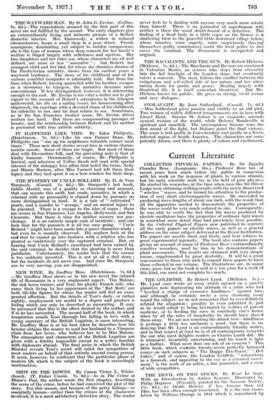THE WAYWARD MAN. By St. John G. Ervine. (Collins. 7s.
6d.)—The expectations aroused by the first part of this novel are not fulfilled by the second. The early chapters give an extraordinarily living and intimate picture of a Belfast domestic interior. Mrs. Dunwoody, a widow in reduced circumstances, keeps a small shop in a poor street. Proud, courageous, dominating, yet subject to sudden compassions, she is the type of woman whose deep concern for her family's welfare is tinged largely with selfishness and egotism. Her two daughters and her elder son, whose characters are all well defined, are more or less " amenable " ; but Robert, her youngest child and her idol, for whom she cherishes dreams of the Presbyterian ministry, shows from his earliest years a wayward tendency. The story of his childhood and of his various youthful escapades is admirably told. But from the time when Robert, having quarrelled with his brother, escapes as a stowaway to Glasgow, the narrative becomes more conventional. If less distinguished, however, it is interesting enough to the end. Mr. Ervine is too vital a writer not to give vigour to the account of Robert's adventures in the Glasgow underworld, his life on a sailing vessel, his homecoming after shipwreck, his marriage with a devoted chum of his childhood, his infidelity to her, and his final return to sea. Sometimes, as in the San Francisco brothel scene, Mr. Ervine drives realism too hard. But there are compensating passages of beauty, and the relationship between Robert and his mother is presented with true artistic subtlety.


















































 Previous page
Previous page